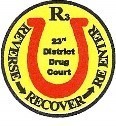23rd District Judicial Advocates, Inc.
Programs
Budget
$160,000.00
Description
The program seeks to identify those offenders who are non-violent & present a history of serious addictive substance abuse. These offenders are identified shortly after arrest. Potentially eligible participants are approached by legal counsel with the proposition of avoiding long periods of incarceration by participation. Those individuals who express interest undergo clinical assessments. Initial staffings conducted by the drug court team make threshold determinations of eligibility. Upon team approval, an intake process is initiated. Ultimately, the participant is released from custody, undergoes a substance abuse treatment program calculated to address the addictive problems experienced, & begins to address other life problems ancillary to the addiction issues. Efforts are made to provide the drug court participant with life skills and resolution of chronic problems which have previously contributed to their involvement in illegal activities.
Program Areas Served
None
$160,000.00
Description
The program seeks to identify those offenders who are non-violent & present a history of serious addictive substance abuse. These offenders are identified shortly after arrest. Potentially eligible participants are approached by legal counsel with the proposition of avoiding long periods of incarceration by participation. Those individuals who express interest undergo clinical assessments. Initial staffings conducted by the drug court team make threshold determinations of eligibility. Upon team approval, an intake process is initiated. Ultimately, the participant is released from custody, undergoes a substance abuse treatment program calculated to address the addictive problems experienced, & begins to address other life problems ancillary to the addiction issues. Efforts are made to provide the drug court participant with life skills and resolution of chronic problems which have previously contributed to their involvement in illegal activities.
Program Areas Served
None
CEO/Executive Director/Board Comments
| Drug and alcohol addiction are serious problems in our community. Historically, addicts have been incarcerated for long periods of time without significant substance abuse treatment or counseling. This resulted in the revolving door of addiction-incarceration. Drug Court provides needed long-term treatment and counseling, resulting in 90% of our graduates staying out of the system after completing the program. They return to society as tax-paying, productive citizens. The 'Opioid Crisis' has spotlighted how the entire population is affected by drug abuse. Crime, homelessness, broken families, joblessness all find a common thread in drug addiction. Most families and all communities have been affected by addiction. Drug Court has proven itself as a comprehensive approach to treating addicts through court action so that they are much less likely to re-offend. |

